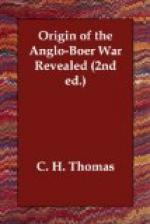The Boer occupation of Natal was found to be wholly prejudicial to British interests on aforesaid accounts, and was, besides, contrary to the express declaration of the Boer emigrants at the time of their exodus from the Cape Colony, which was that their new settlements should be located north of the Orange River. Stepping in to the eastward and claiming part of the littoral constituted a rivalry in conflict with that understanding, and England therefore considered it within her rights to expel the Boers from Natal, and to proceed with the colonization there with British settlers instead. That temporary occupation of Natal had been fraught to the Boers with most stirring episodes—some of the most melancholy description, and others representing records of really unsurpassed heroism, which can but arouse deepest emotions and admiration in any reader of their history. There was the treacherous massacre of Retief and Potgeiter and his party by the Zulu king Dingaan at his military kraal, followed by other wholesale massacres of men, women, and children at Weenen and other Boer camps in Natal. Then came the punitive expedition of 450 Boers, armed with flint-locks only, who utterly defeated Dingaan’s most redoubtable impi of 10,000 warriors, and resulted in the complete overthrow of that Zulu monarch.
When that punitive Boer commando was about to start upon its mission it was solemnly vowed to observe a day of national thanksgiving each year if Divine aid were vouchsafed to accomplish the object. That brilliant victory had occurred on the 16th December, 1838, and the day has ever since been religiously observed as had been vowed. The celebrations in the Transvaal take place at Paarden-kraal, near Johannesburg, and some other accessible and central camping grounds, where the burghers with their families congregate in thousands—a sort of feast of tabernacles, lasting three days, undeterred by the most boisterous weather. The declaration of independence fell on that same date at Paarden-kraal in 1879, and it was also in December of the succeeding year that the Boers proved victorious over the British troops in Natal, after which the Transvaal had its independence generously restored by the Gladstone Ministry (subject to treaty 1881).
On those anniversaries stirring speeches would be made by the elder leading men, rehearsing the events of the nation’s history so as to grave them upon the minds of the younger, and to revive the thankful memories of the elder people. It is only in human nature that unsympathetic feelings against the English would intrude upon the thanksgivings on those occasions, especially as it continues yet to be averred that the British authorities had incited the Zulu king Dingaan to those massacres. Nevertheless, except in instances of implacable natures, the predominant sentiments at those gatherings were those of gratitude to the Almighty and good-will towards all men. After the peace of 1881, it used to be publicly recognised that the English were entitled thenceforth to a first place in the nation’s friendship, and that the retrocession put a term to all recriminations applying to previous dates.




